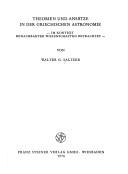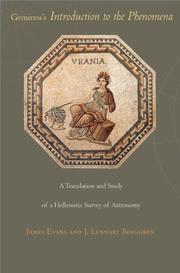| Listing 1 - 10 of 32 | << page >> |
Sort by
|

ISBN: 3515025081 9783515025089 Year: 1976 Volume: 23 Publisher: Wiesbaden Steiner
Abstract | Keywords | Export | Availability | Bookmark
 Loading...
Loading...Choose an application
- Reference Manager
- EndNote
- RefWorks (Direct export to RefWorks)
Book
ISBN: 050040013X Year: 1970 Publisher: London Thames
Abstract | Keywords | Export | Availability | Bookmark
 Loading...
Loading...Choose an application
- Reference Manager
- EndNote
- RefWorks (Direct export to RefWorks)
Astronomy, Greek --- Greek astronomy --- Astronomy, Greek. --- Astronomie grecque

ISBN: 069112339X 9780691123394 Year: 2006 Publisher: Princeton Princeton university press
Abstract | Keywords | Export | Availability | Bookmark
 Loading...
Loading...Choose an application
- Reference Manager
- EndNote
- RefWorks (Direct export to RefWorks)
520.938 --- Sciences Astronomy History Ancient World Greece --- Astronomy --- Astronomy, Greek --- Greek astronomy
Book
ISBN: 9789004243361 9789004243366 9789004400566 9004400567 9004243364 Year: 2019 Publisher: Leiden : Brill,
Abstract | Keywords | Export | Availability | Bookmark
 Loading...
Loading...Choose an application
- Reference Manager
- EndNote
- RefWorks (Direct export to RefWorks)
In Hellenistic Astronomy: The Science in Its Contexts , new essays by renowned scholars address questions about what the ancient science of the heavens was in the ancient Near East and Mediterranean worlds, and the numerous contexts in which it was pursued. Together, these essays will enable readers not only to understand the technical accomplishments of this ancient science but also to appreciate their historical significance by locating the questions, challenges, and issues inspiring them in their political, medical, philosophical, literary, and religious contexts.
Astronomy, Greek --- Astronomy, Ancient --- Hellenism --- Ancient astronomy --- Greek astronomy --- E-books --- Astronomy, Greek. --- Hellenism.
Book
ISBN: 1472552237 1472501705 9781472501707 9780715640630 0715640631 9781472552235 9781472500861 1472500865 Year: 2011 Publisher: London Bristol Classical Press
Abstract | Keywords | Export | Availability | Bookmark
 Loading...
Loading...Choose an application
- Reference Manager
- EndNote
- RefWorks (Direct export to RefWorks)
"This is the first English translation of Simplicius "responses to Philoponus" Against Aristotle on the Eternity of the World. The commentary is published in two volumes: Ian Mueller's previous book in the series, Simplicius: On Aristotle On the Heavens 1.2-3, and this book on 1.3-4. Philoponus, the Christian, had argued that Aristotle' arguments do not succeed. For all they show to the contrary, Christianity may be right that the heavens were brought into existence by the only divine being and one moment in time, and will cease to exist at some future moment. Simplicius upholds the pagan view that the heavens are eternal and divine, and argues that their eternity is shown by their astronomical movements coupled with certain principles of Aristotle. Until the launch of this series, the 15,000 volumes of the ancient Greek commentators on Aristotle constituted the largest corpus of Greek philosophical writings which had not been translated into English or other European languages. There are now over 100 volumes in the series."--Bloomsbury Publishing This is the first English translation of Simplicius' responses to Philoponus' Against Aristotle on the Eternity of the World. The commentary is published in two volumes: Ian Mueller's previous book in the series, Simplicius: On Aristotle On the Heavens 1.2-3, and this book on 1.3-4. Philoponus, the Christian, had argued that Aristotle's arguments do not succeed. For all they show to the contrary, Christianity may be right that the heavens were brought into existence by the only divine being and one moment in time, and will cease to exist at some future moment. Simplicius upholds the pagan view that the heavens are eternal and divine, and argues that their eternity is shown by their astronomical movements coupled with certain principles of Aristotle. The English translation in this volume is accompanied by a detailed introduction, extensive commentary notes and a bibliography.
Astronomy, Ancient. --- Cosmology, Ancient. --- Astronomy, Greek --- Cosmology --- Greek astronomy --- Ancient cosmology --- Ancient astronomy --- Aristotle.
Book
ISBN: 9781407358628 9781407358635 1407358626 Year: 2021 Publisher: Oxford BAR Publishing
Abstract | Keywords | Export | Availability | Bookmark
 Loading...
Loading...Choose an application
- Reference Manager
- EndNote
- RefWorks (Direct export to RefWorks)
Astronomy, Greek. --- Spherical astronomy --- Mythology, Greek. --- Astronomy, Greek --- Mythology, Greek --- Greek astronomy --- Greek mythology
Book
ISSN: 03425991 ISBN: 9783769616385 3769616383 Year: 2006 Volume: 2006 (3) Publisher: München : Bayerische Akademie der Wissenschaften,
Abstract | Keywords | Export | Availability | Bookmark
 Loading...
Loading...Choose an application
- Reference Manager
- EndNote
- RefWorks (Direct export to RefWorks)
Astronomy, Greek --- Astronomy, Greek. --- Dierenriem. --- Griekse oudheid. --- Hemel. --- Poorten (gebouwen) --- Poorten (gebouwen). --- Greek astronomy --- Astrologie --- Mythologie grecque --- Grèce --- Antiquité
Book
ISBN: 3519017326 9783598717321 3598717326 3110936925 9783110936926 9783519017325 Year: 1974 Publisher: Stuttgart Teubner
Abstract | Keywords | Export | Availability | Bookmark
 Loading...
Loading...Choose an application
- Reference Manager
- EndNote
- RefWorks (Direct export to RefWorks)
Procli Diadochi hypotyposis astronomicarum positionum (Bibliotheca Teubneriana)
Astronomy, Greek --- Astronomy --- Astronomie grecque --- Astronomie --- Early works to 1800 --- Ouvrages avant 1800 --- Astronomy, Greek. --- Greek astronomy
Book
ISBN: 1472552229 1472501667 9781472501660 9780715639207 071563920X Year: 2011 Publisher: London Bristol Classical Press
Abstract | Keywords | Export | Availability | Bookmark
 Loading...
Loading...Choose an application
- Reference Manager
- EndNote
- RefWorks (Direct export to RefWorks)
"This is the first complete translation into a modern language of the first part of the pagan Neoplatonist Simplicius of Cilicia's commentary on Aristotle's argument that the world neither came to be nor will perish. It is notable and unusual among the commentaries because Simplicius includes in his discussion lengthy representations of the Christian John Philoponus' criticisms of Aristotle along with his own, frequently heavily sarcastic, responses."--Bloomsbury Publishing One of the arguments in Aristotle's On the Heavens propounds that the world neither came to be nor will perish. This volume contains the pagan Neoplatonist Simplicius of Cilicia's commentary on the first part of this this important work. The commentary is notable and unusual because Simplicius includes in his discussion lengthy representations of the Christian John Philoponus' criticisms of Aristotle along with his own, frequently sarcastic, responses. This is the first complete translation into a modern language of Simplicius' commentary, and is accompanied by a detailed introduction, extensive explanatory notes and a bibliography.
Astronomy, Ancient. --- Cosmology, Ancient. --- Astronomy, Greek --- Cosmology --- Greek astronomy --- Ancient cosmology --- Ancient astronomy --- Aristotle. --- Astronomy, Greek. --- Cosmology. --- Astronomy --- Deism --- Metaphysics
Book
ISBN: 9783110402216 3110402211 9783110402766 9783110402810 3110402815 3110402769 9783110402773 3110402777 Year: 2015 Publisher: Berlin
Abstract | Keywords | Export | Availability | Bookmark
 Loading...
Loading...Choose an application
- Reference Manager
- EndNote
- RefWorks (Direct export to RefWorks)
Beim Traktat des bekannten alexandrinischen Gelehrten und Aristoteles-Kommentators Johannes Philoponos (6. Jh. n. Chr.) über das Astrolab handelt es sich um eine kleine, für die Wissenschaftsgeschichte aber sehr bedeutsame Schrift, da es die älteste erhaltene Beschreibung und Funktionsanleitung des später besonders im islamischen Bereich weit verbreiteten astronomischen Gerätes enthält. Die Schrift ist in der Philologie recht stiefmütterlich behandelt worden und war bis jetzt lediglich als Beitrag im ‚Rheinischen Museum‘ von 1839 zugänglich. Das Ziel des vorliegenden Büchleins besteht darin, den griechischen Text in einer neu redigierten, durch Berücksichtigung weiterer Handschriften gestützten Fassung vorzulegen und die Abhandlung mit einer deutschen Übersetzung und den nötigen Erläuterungen und Illustrationen einem weiteren Interessentenkreis zugänglich zu machen. Den griechischen Vorfahren der späteren kunstvollen islamischen und abendländischen Astrolabgeräten kennenzulernen, dürfte nicht nur den Fachmann interessieren. This treatise on the astrolabe by the Alexandrian scholar John Philoponos includes the earliest preserved description of the planispherical device that was later widely disseminated during the Middle Ages. Stückelberger’s edition is intended for philologists as well as historians and astronomers. The newly edited Greek text is accompanied by a German translation, explanations, and illustrations.
Astrolabes --- Early works to 1800 --- Ouvrages avant 1800 --- Ouvrages avant 1800. --- Astronomy, Greek. --- Astronomical instruments --- Greek astronomy --- History.
| Listing 1 - 10 of 32 | << page >> |
Sort by
|

 Search
Search Feedback
Feedback About UniCat
About UniCat  Help
Help News
News